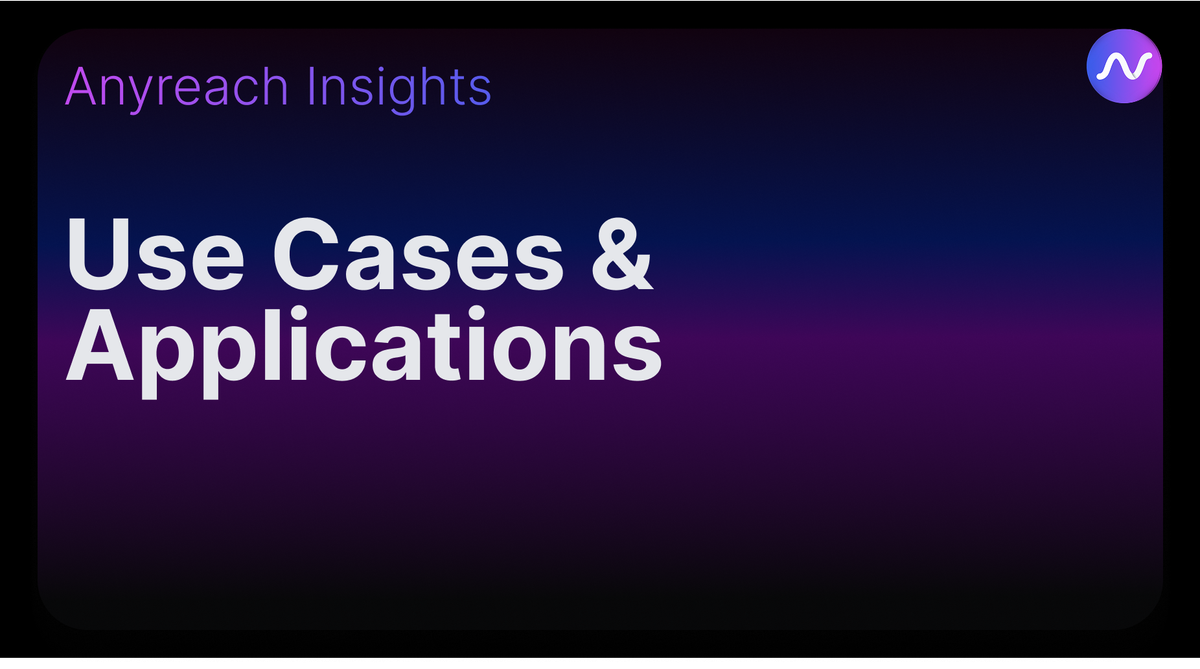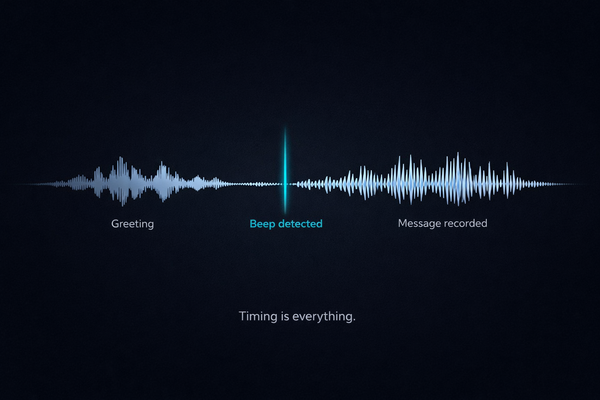How Enterprises Apply Agentic AI: Real-World Use Cases and Applications

As enterprises navigate the rapidly evolving landscape of artificial intelligence, agentic AI—autonomous, goal-driven systems capable of making decisions and taking actions—has emerged as a transformative force for business operations. From automating customer interactions to streamlining complex sales workflows, these intelligent agents are reshaping how mid-to-large BPOs and service-oriented companies approach their most critical processes.
What is agentic AI for customer support?
Agentic AI for customer support refers to autonomous AI systems that handle customer inquiries, resolve issues, and manage interactions across multiple channels without constant human oversight, learning and adapting from each interaction to improve service quality.
Unlike traditional chatbots that follow rigid scripts, agentic AI systems possess the capability to understand context, make decisions, and take appropriate actions based on customer needs. These systems integrate seamlessly with existing CRM platforms, knowledge bases, and ticketing systems to provide comprehensive support experiences.
In practice, agentic AI transforms customer support by:
- Automatically categorizing and routing inquiries to appropriate departments
- Resolving common issues without human intervention
- Escalating complex cases with full context to human agents
- Learning from successful resolutions to improve future interactions
- Operating 24/7 across voice, chat, email, and SMS channels
According to Gartner's latest research, enterprises implementing agentic AI for customer support report a 35% reduction in average handling time and a 40% improvement in first-contact resolution rates. The technology's ability to maintain consistent service quality while scaling to handle peak volumes makes it particularly valuable for BPOs managing multiple client accounts.
How does omnichannel AI automate lead qualification in BPOs?
Omnichannel AI automates lead qualification in BPOs by simultaneously engaging prospects across multiple touchpoints—email, SMS, voice, and chat—using intelligent scoring algorithms that assess intent, budget, and timeline while maintaining consistent messaging and data synchronization across all channels.
The automation process begins when a lead enters the system through any channel. The AI agent immediately accesses historical data, analyzes behavioral patterns, and initiates personalized engagement sequences. For BPOs handling diverse client portfolios, this capability enables standardized qualification processes while maintaining client-specific criteria.
| Channel | AI Automation Capability | Qualification Metrics |
|---|---|---|
| Voice AI | Natural conversation flow, sentiment analysis | Engagement depth, objection patterns |
| SMS Automation | Contextual responses, appointment scheduling | Response rates, commitment indicators |
| Chat Automation | Real-time qualification questions, document collection | Information completeness, urgency signals |
| Email Outreach | Personalized sequences, follow-up timing | Open rates, content engagement |
McKinsey reports that BPOs implementing omnichannel AI for lead qualification experience a 50% reduction in qualification time and a 30% increase in qualified lead conversion rates. The technology's ability to maintain persistent engagement across channels ensures no potential opportunity falls through the cracks.
What are best practices for using voice AI in appointment booking for healthcare services?
Best practices for voice AI in healthcare appointment booking include implementing HIPAA-compliant systems with natural language understanding, providing clear verbal confirmations, offering human handoff options, and integrating with existing EMR systems while maintaining patient privacy and accessibility standards.
Healthcare organizations face unique challenges when deploying voice AI, balancing efficiency gains with regulatory compliance and patient trust. Successful implementations follow these proven practices:
1. Compliance and Security First
- Implement end-to-end encryption for all voice interactions
- Ensure HIPAA-compliant data storage and transmission
- Maintain detailed audit logs for all appointments scheduled
- Use role-based access controls for system administration
2. Natural Conversation Design
- Train AI on medical terminology and common patient phrases
- Implement multi-language support for diverse patient populations
- Design conversations that feel empathetic and patient-centered
- Allow for natural pauses and thinking time during calls
3. Integration Excellence
- Seamlessly connect with EMR/EHR systems for real-time availability
- Automatically send appointment confirmations via preferred channels
- Update patient records with scheduling preferences
- Sync with provider calendars to prevent double-booking
Deloitte's healthcare technology report indicates that properly implemented voice AI systems reduce appointment no-show rates by 23% and decrease administrative burden by 40 hours per week for mid-size practices.
How can IT troubleshooting be automated with agentic AI?
IT troubleshooting automation through agentic AI involves deploying intelligent agents that diagnose technical issues, execute remediation scripts, and learn from resolution patterns to proactively prevent future problems while maintaining detailed documentation of all actions taken.
Modern IT environments generate thousands of alerts daily, making manual troubleshooting increasingly unsustainable. Agentic AI transforms this landscape by creating autonomous systems capable of:
Intelligent Diagnosis
AI agents analyze system logs, performance metrics, and error patterns to identify root causes without human intervention. They correlate seemingly unrelated events across infrastructure layers, often detecting issues before users report them.
Automated Remediation
Once diagnosed, agents execute pre-approved remediation workflows:
- Restart services or applications
- Clear cache and temporary files
- Adjust resource allocations
- Apply configuration changes
- Roll back problematic updates
Continuous Learning
Each resolution adds to the AI's knowledge base, improving future diagnosis accuracy. The system identifies patterns in recurring issues and suggests permanent fixes or infrastructure improvements.
According to Forrester Research, enterprises using agentic AI for IT troubleshooting report 60% faster mean time to resolution (MTTR) and 45% reduction in ticket volume through proactive issue prevention.
What role does sales automation play in recruiting workflows?
Sales automation in recruiting workflows streamlines candidate outreach, qualification, and engagement through AI-driven personalization, automated follow-ups, and intelligent scheduling, enabling recruiters to focus on high-value activities like relationship building and final assessments.
The recruiting industry has embraced sales automation techniques to address the challenge of engaging passive candidates and managing high-volume hiring. Key applications include:
Automated Candidate Outreach
- Personalized initial contact based on candidate profiles
- Multi-channel engagement (LinkedIn, email, SMS)
- A/B testing of messaging for optimal response rates
- Timing optimization based on candidate behavior patterns
Intelligent Qualification
- Automated screening questions via conversational AI
- Skills assessment through interactive challenges
- Cultural fit evaluation using psychometric indicators
- Automatic ranking based on role requirements
Engagement Nurturing
- Drip campaigns for passive candidates
- Event invitations and company updates
- Personalized content based on career interests
- Re-engagement of previous applicants for new roles
LinkedIn's Global Recruiting Trends report shows that recruiters using sales automation tools fill positions 40% faster and maintain 3x larger talent pipelines than those using traditional methods.
How do enterprises implement chat automation for scalable customer interactions?
Enterprises implement chat automation through AI-powered platforms that handle multiple simultaneous conversations, understand context and intent, integrate with backend systems for real-time data access, and seamlessly escalate to human agents when needed, all while maintaining conversation history and learning from each interaction.
Successful chat automation deployment follows a structured approach:
Phase 1: Foundation Building
- Use Case Identification: Start with high-volume, repetitive queries
- Knowledge Base Development: Create comprehensive FAQ databases
- Integration Planning: Map connections to CRM, ERP, and support systems
- Conversation Design: Develop natural dialogue flows
Phase 2: Technical Implementation
| Component | Implementation Focus | Success Metrics |
|---|---|---|
| NLP Engine | Intent recognition, entity extraction | Accuracy rate >95% |
| Integration Layer | API connections, data synchronization | Response time <2 seconds |
| Escalation Logic | Sentiment triggers, complexity thresholds | Appropriate escalation rate |
| Analytics Platform | Conversation tracking, performance monitoring | Actionable insights generated |
Phase 3: Optimization and Scaling
- Continuous training based on conversation logs
- A/B testing of response variations
- Expansion to new use cases and departments
- Multi-language support implementation
Accenture's research indicates that enterprises with mature chat automation handle 80% of routine inquiries without human intervention, resulting in 50% cost reduction per interaction.
What are the key considerations for SMS automation in education sector outreach?
Key considerations for SMS automation in education include FERPA compliance, opt-in consent management, message timing for different stakeholder groups (students, parents, staff), character limit optimization, and integration with student information systems while maintaining accessibility and inclusivity standards.
Educational institutions face unique challenges when implementing SMS automation:
Regulatory Compliance
- FERPA Requirements: Ensure no personally identifiable information in messages
- TCPA Compliance: Maintain proper consent records and opt-out mechanisms
- Age-Appropriate Communication: Different protocols for minors vs. adult learners
- Accessibility Standards: Plain language requirements for diverse populations
Stakeholder Segmentation
- Students: Class reminders, assignment deadlines, campus alerts
- Parents/Guardians: Attendance notifications, grade updates, event invitations
- Faculty/Staff: Meeting reminders, policy updates, emergency communications
- Alumni: Fundraising campaigns, event invitations, news updates
Technical Implementation
- Integration with Student Information Systems (SIS)
- Dynamic message personalization based on enrollment data
- Multi-language support for diverse communities
- Delivery confirmation and engagement tracking
The Chronicle of Higher Education reports that institutions using SMS automation see 85% open rates compared to 20% for email, with particular effectiveness in reducing student dropout rates by maintaining consistent engagement.
How does agentic AI transform lead qualification processes?
Agentic AI transforms lead qualification by autonomously engaging prospects through intelligent conversations, scoring leads based on multidimensional criteria, predicting conversion probability using machine learning, and continuously optimizing qualification criteria based on actual sales outcomes.
Traditional lead qualification relies heavily on manual processes and static scoring models. Agentic AI revolutionizes this through:
Dynamic Engagement Strategies
- Real-time personalization based on prospect behavior
- Adaptive questioning that follows natural conversation flow
- Multi-touch attribution across all engagement channels
- Sentiment analysis to gauge purchase intent
Intelligent Scoring Models
AI agents evaluate leads across multiple dimensions:
| Scoring Factor | AI Analysis Method | Weight in Model |
|---|---|---|
| Behavioral Signals | Website activity, content engagement | 30% |
| Firmographic Data | Company size, industry, revenue | 25% |
| Engagement Depth | Response time, conversation quality | 25% |
| Intent Indicators | Specific questions, urgency language | 20% |
Predictive Analytics
Machine learning models analyze historical conversion data to:
- Identify patterns in successful conversions
- Predict optimal follow-up timing
- Recommend next best actions for sales teams
- Forecast deal probability and potential value
Salesforce research shows that companies using AI-driven lead qualification experience 50% higher conversion rates and 40% shorter sales cycles compared to traditional methods.
What infrastructure is needed for enterprise voice AI deployment?
Enterprise voice AI deployment requires cloud-based telephony infrastructure, high-performance computing resources for real-time processing, secure API gateways for system integration, redundant network architecture for reliability, and comprehensive monitoring tools for quality assurance and compliance tracking.
Building a robust voice AI infrastructure involves several critical components:
Core Technical Requirements
- Telephony Infrastructure
- SIP trunking for scalable call handling
- WebRTC support for browser-based interactions
- Global carrier connections for international reach
- Number porting and management capabilities
- Computing Resources
- GPU-accelerated servers for speech processing
- Auto-scaling capabilities for peak loads
- Edge computing nodes for reduced latency
- Redundant data centers for high availability
- Integration Architecture
- RESTful APIs for CRM/ERP connections
- Message queuing for asynchronous processing
- Webhook support for real-time events
- Database connectors for customer data access
Security and Compliance Layer
- End-to-end encryption for voice streams
- PCI-DSS compliance for payment processing
- Call recording with secure storage
- Access control and authentication systems
Monitoring and Analytics
- Real-time call quality monitoring
- Sentiment analysis dashboards
- Performance metrics tracking
- Compliance audit trails
Gartner estimates that enterprises need to budget $500K-$2M for initial voice AI infrastructure, with ongoing operational costs of $50K-$200K monthly depending on call volume and complexity.
How can consulting firms leverage agentic AI for client engagement?
Consulting firms leverage agentic AI for client engagement by deploying intelligent agents that automate proposal generation, provide 24/7 client support, analyze engagement data for insights, personalize communication strategies, and free consultants to focus on high-value strategic work.
The consulting industry's relationship-driven nature makes it an ideal candidate for agentic AI enhancement:
Automated Proposal Development
AI agents transform the proposal process by:
- Analyzing RFPs to extract key requirements
- Matching requirements with firm capabilities and case studies
- Generating initial proposal drafts with relevant methodologies
- Customizing language and approach based on client industry
- Ensuring compliance with client-specific formatting requirements
Continuous Client Support
Agentic AI provides always-on client service through:
- Project Status Updates: Real-time progress reporting via preferred channels
- Resource Scheduling: Automated consultant availability and booking
- Knowledge Access: Instant answers from firm's knowledge base
- Escalation Management: Intelligent routing of complex issues
Engagement Intelligence
| Analytics Type | AI Capability | Business Impact |
|---|---|---|
| Sentiment Tracking | Email and call analysis for client satisfaction | 15% improvement in retention |
| Engagement Scoring | Multi-channel interaction analysis | 25% better project outcomes |
| Risk Detection | Early warning signals for account issues | 30% reduction in client churn |
| Opportunity Identification | Cross-sell and upsell recommendations | 20% revenue growth per client |
McKinsey's research on professional services indicates that firms using agentic AI for client engagement report 35% higher client satisfaction scores and 40% more efficient resource utilization.
Frequently Asked Questions
How long does it take to implement agentic AI for customer support?
Implementation typically takes 3-6 months from initial setup to full deployment. The timeline includes 1-2 months for system configuration and integration, 1-2 months for training and testing, and 1-2 months for phased rollout and optimization. Factors affecting timeline include integration complexity, data quality, and organizational readiness.
What is the ROI of implementing omnichannel AI for lead qualification?
Organizations typically see ROI within 6-12 months, with average returns of 300-400% over three years. Key metrics include 50% reduction in qualification time, 30% increase in qualified lead conversion, and 40% decrease in cost per qualified lead. BPOs handling multiple clients often see even higher returns due to economies of scale.
How do you ensure HIPAA compliance when using voice AI for healthcare appointment booking?
HIPAA compliance requires implementing Business Associate Agreements (BAAs) with all vendors, using end-to-end encryption for voice data, maintaining detailed audit logs, implementing role-based access controls, and ensuring secure data storage with automatic deletion policies. Regular security assessments and staff training are also essential.
Can agentic AI completely replace human agents in IT troubleshooting?
While agentic AI can handle 60-80% of routine IT issues autonomously, human agents remain essential for complex problem-solving, strategic decision-making, and situations requiring empathy or creative solutions. The optimal approach combines AI efficiency with human expertise, allowing IT staff to focus on high-value activities.
What are the main challenges in implementing SMS automation for educational institutions?
Key challenges include ensuring FERPA compliance, managing opt-in consent across diverse stakeholder groups, integrating with legacy student information systems, handling multi-language requirements, and balancing automation efficiency with the personal touch expected in educational communications. Budget constraints and change management also pose significant hurdles.
How much does it cost to deploy enterprise-grade voice AI infrastructure?
Initial infrastructure investment ranges from $500K to $2M, including telephony systems, computing resources, and integration development. Ongoing operational costs run $50K-$200K monthly based on call volume, complexity, and support requirements. Cloud-based solutions can reduce upfront costs but may have higher long-term operational expenses.
What metrics should consulting firms track when using agentic AI for client engagement?
Essential metrics include client satisfaction scores (CSAT/NPS), response time reduction, proposal win rates, consultant utilization rates, client retention rates, revenue per client, and engagement depth across channels. Advanced analytics should track sentiment trends, risk indicators, and opportunity identification accuracy.
How do you train sales teams to work effectively with AI automation tools?
Effective training combines hands-on workshops, role-playing scenarios with AI tools, continuous coaching, and performance tracking. Start with AI-assisted activities before full automation, emphasize how AI enhances rather than replaces their role, provide clear escalation protocols, and celebrate early wins to build adoption momentum.
Conclusion
The transformation potential of agentic AI across enterprise use cases is undeniable. From revolutionizing customer support and lead qualification to streamlining IT troubleshooting and recruitment workflows, these autonomous systems are reshaping how businesses operate and compete. For mid-to-large BPOs and service-oriented companies, the question is no longer whether to adopt agentic AI, but how to implement it effectively.
Success requires a thoughtful approach that balances technological capabilities with organizational readiness. Whether deploying voice AI for appointment booking, implementing chat automation for customer interactions, or leveraging SMS automation for outreach, enterprises must prioritize compliance, integration, and change management alongside technical implementation.
As the technology continues to evolve, organizations that embrace agentic AI while maintaining focus on human-AI collaboration will find themselves best positioned to deliver exceptional service, improve operational efficiency, and drive sustainable growth. The journey from pilot to production may be complex, but the potential rewards—in terms of cost savings, service quality, and competitive advantage—make it a critical investment for forward-thinking enterprises.
The key to success lies in starting with well-defined use cases, building robust infrastructure, ensuring compliance and security, and maintaining a relentless focus on continuous improvement. As these real-world applications demonstrate, agentic AI is not just a futuristic concept—it's a present-day reality transforming how enterprises engage with customers, manage operations, and drive growth.
]]>




![[AI Digest] Agents Coordinate Plan Deploy Scale](/content/images/size/w600/2025/07/Daily-AI-Digest.png)